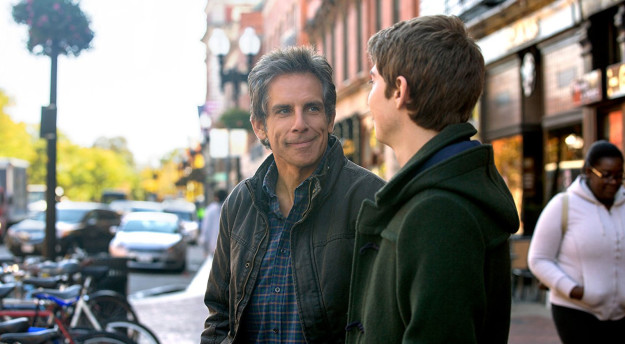
1. Brad’s Status

Ben Stiller and Austin Abrams in Brad’s Status.
Seacia Pavao / Annapurna Pictures
Brad’s Status is a portrait of white middle-class male anxiety that’s so dead-on, it’s actually excruciating to watch. That might sound like a strange sort of recommendation, but the film is the work of writer-director Mike White, creator of Enlightened and scripter of Chuck & Buck and The Good Girl — a man for whom discomfort is an art form. In lead actor Ben Stiller, doing a more serious turn, White’s found an excellent collaborator with whom to create some truly exquisite cringy-ness. Stiller, with a trying, restless dissatisfaction, plays the Brad of the title — a Sacramento man who runs a small nonprofit and shares a nice suburban house with his wife (Jenna Fischer) and their teenage son, Troy (Austin Abrams). Troy’s a sweet, smart kid, but his likely acceptance into Harvard comes as a surprise and then seismic shock to his father, who hadn’t expected it, and who’s been busy grappling with fading idealism and a general sense of having already peaked.
By any rational measure, Brad’s life is a comfortable and happy one. But he can’t help seeing himself as a failure compared to his undergrad pals (played by Jemaine Clement, Michael Sheen, Luke Wilson, and White himself), who’ve gone on to wealth and fame. Plunged into turmoil in the midst of taking his kid on a college tour, Brad vacillates between elated hope for Troy’s future and a desperate desire for him to avoid what Brad perceives as his own lack of success, feelings that are expounded upon in claustrophobic voiceover. Until White softens up right at the end, Brad’s Status is a quiet but hilariously biting portrayal of earnest liberalism running up against lingering white entitlement.
How to see it: Brad’s Status is now in theaters in limited release.
2. Clínica de Migrantes: Life, Liberty, and the Pursuit of Happiness
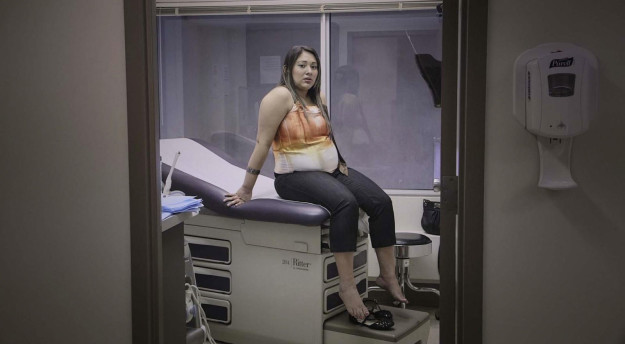
Clínica de Migrantes: Life, Liberty, and the Pursuit of Happiness.
HBO
Mainstream attention tends to turn to short documentaries only once a year, when their category presents a mystifying challenge of five unfamiliar titles to choose from when filling out Oscar pool ballots. But Clínica de Migrantes deserves to be seen and to be talked about beyond its awards potential. Director Maxim Pozdorovkin (Pussy Riot: A Punk Prayer) has made a 40-minute movie that isn’t just emotionally wrenching, but remarkably timely, occupying territory at the intersection of our current, urgent conversations about health care and immigration. The film profiles Puentes de Salud, a nonprofit, volunteer-run clinic in south Philadelphia that offers free medical treatment to undocumented, uninsured, and financially insecure immigrants who otherwise don’t have access to it.
Clínica de Migrantes observes patients who come in, some in desperate need after having been denied health care elsewhere, or having gone without it as long as possible out of fear of deportation. In simply depicting the day-to-day operation of the clinic, it’s a powerful record of some of the difficult realities and vulnerabilities that come with being undocumented. But it’s also a resonant film about health care, about doctors who actually strive to understand their patients’ working and domestic realities, who try to earn their trust and to help them navigate bills from other hospitals. It presents, simply and movingly, a case for caring for those who need it as a moral mandate.
How to see it: Clínica de Migrantes: Life, Liberty, and the Pursuit of Happiness is now streaming on HBO.
3. First They Killed My Father: A Daughter of Cambodia Remembers
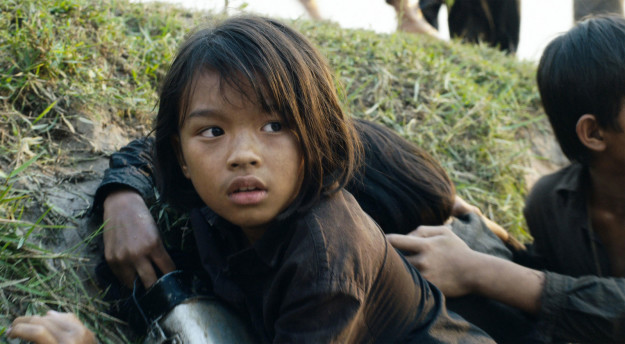
Sareum Srey Moch in First They Killed My Father: A Daughter of Cambodia Remembers.
Netflix
Angelina Jolie’s career as a director has taken a wildly unpredictable path. First she took on a fraught romance straddling different sides of the Bosnian War in In the Land of Blood and Honey, then made a staid bid for Oscar glory with the World War II movie Unbroken, and more recently offered up the 2015 lush, indulgent melodrama By the Sea, in which she and soon-to-be-ex-husband Brad Pitt played troubled (and childless) marrieds and also played peek-a-boo with promises of insight into their real-life relationship. And now, it’s back to war with a film based on Loung Ung’s memoir about what happened to her during the reign of the Khmer Rouge — a child’s-eye view on a devastating period in Cambodian history.
But despite Jolie’s seeming intentions here to use cinema as an extension of her humanitarian work, she’s too interesting a filmmaker to turn out the movie equivalent of vegetables, something to be consumed dutifully under the recommendation that it’s good for you. First They Killed My Father has worth as a work of art beyond its devastating subject matter, in particular in the way it approaches the atrocities it depicts through the perspective of someone whose understanding of what’s happening is limited. Young Loung (first-time actor Sareum Srey Moch) and her family have their world upended with dizzying speed, going from a middle-class existence in Phnom Penh to being scattered among work camps, where people starve and are executed. Aside from the jarring montage at the start, the film is freed from having to explain the whys of what’s happening, allowing it to be an act of sensory overload, a rush of unsettling images. It’s all the more powerful for being so experiential, a national apocalypse as seen by someone who’s only just grasped what death is.
How to see it: First They Killed My Father is now streaming on Netflix.
4. Lucky
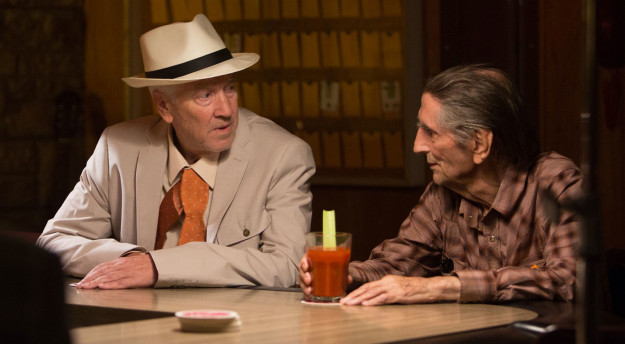
David Lynch and Harry Dean Stanton in Lucky.
Magnolia Pictures
Screen legend Harry Dean Stanton, who died in September, couldn’t have picked a more fitting swan song for himself than Lucky, the directorial debut of fellow character actor John Carroll Lynch. Stanton plays the title character, a ninetysomething man whose comfortable routine gets a jolt when he collapses one morning and is forced to confront his own (and everyone else’s) mortality. But Lucky is joyful, not mournful, a rambling opportunity to while away an hour and a half in the company of an actor who rarely got a leading role, but who delightfully fills out this one.
Lucky isn’t cantankerous so much as he is incapable of altering his behavior to accommodate anyone at this point in his life. He’s been pared down to his essential self, looping from the diner of his small desert town to the store to buy cigarettes (his doctor, baffled by his health, suggests he’d best never quit smoking), back home to watch game shows, and then off to have a drink. Different characters drift through to shoot the shit, including David Lynch as a bar regular whose tortoise has gone missing, Tom Skerritt as a fellow former WWII vet, and Ron Livingston as a lawyer urging Lucky to look into estate planning. It’s the kind of loose-limbed movie that you visit more than you watch, and it’s an awfully pleasurable stay.
How to see it: Lucky is now in theaters in limited release — here’s a list of locations.
5. Rat Film

Rat Film.
The Cinema Guild
Theo Anthony’s Rat Film is an essay in the form of a convention-busting documentary that starts by recounting a creation myth (in which a rodent nibbles the world into existence) and then works its way up to another story of conception. It’s about rats — including the one shown trying to leap out of a trash can in one of the first shots — and the neighborhoods in which infestations have been the worst. But it’s also about the formation of an American city, and specifically about the forces of redlining that shaped Baltimore, where Anthony is from. His film flips from computer-generated images of streets as a video game landscape to historical maps, from a pest control specialist at work to an examination of how the area was split up into risk zones for homeowner loans that were, functionally, a form of segregation.
While the score, by fellow Baltimore native Dan Deacon, offers an enveloping whirl of electronic sounds, Rat Film adds layers upon layers to its dense argument about how acts of urban planning and engineering can conceal acts of racism and classism, and about how their legacy can be felt today. It’s a brilliantly ambitious and unapologetically odd movie that might be best summed up by philosophical exterminator Harold Edmond, one of the interviewees, when he says: “It ain’t never been a rat problem in Baltimore. Always been a people problem.”
How to see it: Rat Film is now in theaters in limited release — here’s a list of locations.
6. Strong Island
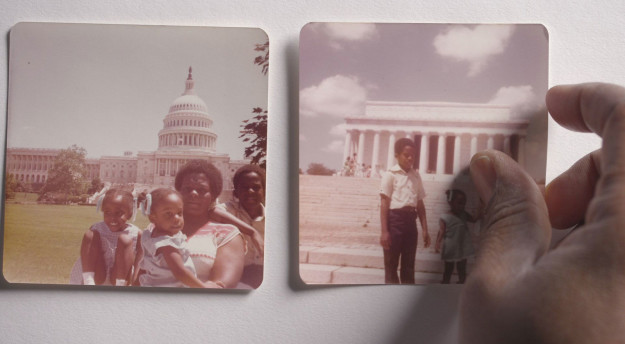
Strong Island.
Netflix
In 1992, filmmaker Yance Ford’s brother William was killed during an altercation with a local mechanic on Long Island, where the family lived. William was unarmed, but he was black, and the man who shot him was white, and an all-white grand jury decided not to indict the latter, to the shock and distress of the Fords, declaring the act one of self-defense. As an instance of racialized injustice, it’s a story that feels sickeningly familiar, but for Ford, it’s obviously also intensely and agonizingly personal. Strong Island, Ford’s directorial debut, is about William’s death, but it’s also about how his family contended with both grief and feeling so devastatingly wronged — how it fell apart in the wake of this brutal reminder of who was really welcome on the path of upward mobility their suburban town seemed to offer.
Ford’s film presents a heartbreakingly detailed portrait of his brother as an outraged counterpoint to the demonization done in court to present him as so dangerous he deserved to be murdered, sometimes punctuated by confrontational if formally distancing sequences in which Ford talks directly to the camera. But it’s Ford’s mother who provides the film’s most devastating moment when she reminisces about how she feels she failed her son: “I did William a great disservice in raising him the way we did. We’ve always tried to teach you guys that you see character, and not color. And many, many times I wonder, how I could be so wrong?“
How to see it: Strong Island is now streaming on Netflix.

